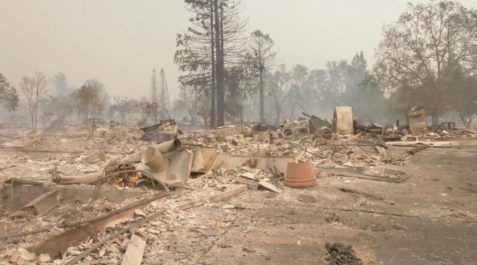Northern California fires may hammer tourism, add to housing crisis
 The deadly and massively destructive wildfires now in their second week of ravaging Northern California’s wine country are likely to have lengthy negative effects on the region’s economy. But it could also exacerbate perhaps its most pressing social problem – housing costs so high they leave even some middle-class families living paycheck to paycheck.
The deadly and massively destructive wildfires now in their second week of ravaging Northern California’s wine country are likely to have lengthy negative effects on the region’s economy. But it could also exacerbate perhaps its most pressing social problem – housing costs so high they leave even some middle-class families living paycheck to paycheck.
Nationally, the focus has been on the numbers illustrating the extent of the disaster – 200,000-plus acres charred, at least 40 dead and hundreds missing, perhaps more than 10,000 structures burned. But for those most directly affected, there are much more long-term fears. After Hurricane Katrina hammered New Orleans in 2005, Louisiana officials said it led to a “lost decade.”
It’s clear that dozens of wineries suffered some damage, and several were destroyed or badly damaged, including White Rock Vineyards, Ancient Oak Cellars, Paradise Ridge and Signorello Valley. The city of Santa Rosa suffered body blows to its visitor industry with the destruction of the Hilton Sonoma Wine Country hotel, Willi’s Wine Bar, the Cricklewood steakhouse, the Fountaingrove Inn and several other tourist mainstays.
This weekend, in small towns and unincorporated areas west of the main fire damage, about two dozen hotels and hundreds of private rentals were in good condition and remained open. But in hard-hit communities, with the focus remaining on firefighting efforts, it’s not clear yet how bad the damage has been to popular tourism centers, wine facilities and more. The idea that rebuilding might be quick and relatively easy is tough to square with grim images from Napa and Sonoma counties.
Authorities also emphasize that while they are optimistic, it is not a sure thing that the current fires will be contained in coming days, and they warn that windy, dry conditions could spur new infernos.
The concern about the wildfires’ economic toll is well-grounded. According to wine industry research, in 2014, tourism and wine production were responsible for about 100,000 jobs in Napa and Sonoma counties, generating $26 billion annually for the regional economy.
The region’s tourism-wine industry has already faced recent disruptions. In 2015, nearly 2,000 homes in Lake, Napa and Sonoma counties were torched by the Valley Fire.
Area already had shortage of skilled construction workers
But the latest wildfires mean another headache for the industry may only worsen: the high cost of housing, which can make it difficult to find workers for modest-paying hotel and restaurant jobs and often complicates efforts to bring in agricultural laborers.
Last month, according to realtor.com statistics, the median home price was $876,200 in Napa County and $750,000 in Sonoma County.
Average rents for modest single-family homes in the Napa area were about $2,400 before the blazes, with comparable figures in Sonoma County. Still, earlier this year, a real-estate blogger wrote that it was possible to find monthly rentals of $1,500 or even a little less.
But that claim could be ancient history in the wake of the fires taking nearly 6,000 homes – so far – out of an already-tight market. While many will be rebuilt, real-estate agents see an even-tighter market ahead, especially in Sonoma County, which has so far lost about 2,800 homes. That’s 4 percent of the county’s 67,000 housing units.
A Bay Area News Group report offered a downbeat take on how quickly the region’s housing stock might bounce back. With insurers paying for the rebuilding of homes, there will be a massive demand for skilled construction workers – and the region already had a shortage of such workers before this month’s fires, the article noted.
One expert offered hope that the wine country price shock would be limited – but for a reason that’s troubling in its own right.
“Pricing can go down, possibly, because the area is burned out and not an attractive place to live,” economics researcher Randall Bell told the Bay Area News Group.
Chris Reed
Chris Reed is a regular contributor to Cal Watchdog. Reed is an editorial writer for U-T San Diego. Before joining the U-T in July 2005, he was the opinion-page columns editor and wrote the featured weekly Unspin column for The Orange County Register. Reed was on the national board of the Association of Opinion Page Editors from 2003-2005. From 2000 to 2005, Reed made more than 100 appearances as a featured news analyst on Los Angeles-area National Public Radio affiliate KPCC-FM. From 1990 to 1998, Reed was an editor, metro columnist and film critic at the Inland Valley Daily Bulletin in Ontario. Reed has a political science degree from the University of Hawaii (Hilo campus), where he edited the student newspaper, the Vulcan News, his senior year. He is on Twitter: @chrisreed99.
Related Articles
Proposed bill would mandate 100 percent renewable energy in California
Joining a would-be trend that includes lawmakers in deep blue Massachusetts, Senate majority leader Kevin de León, D-Los Angeles, has
CA eyes freeway generator technology as new energy source
The streetwise alternative energy dreams of one California officeholder have been given a tentative green light in Sacramento. If
Coming days could be pivotal in bullet-train fight
Friday — or sooner — will see a crucial development in the five-year fight over implementation of Proposition 1A, the




